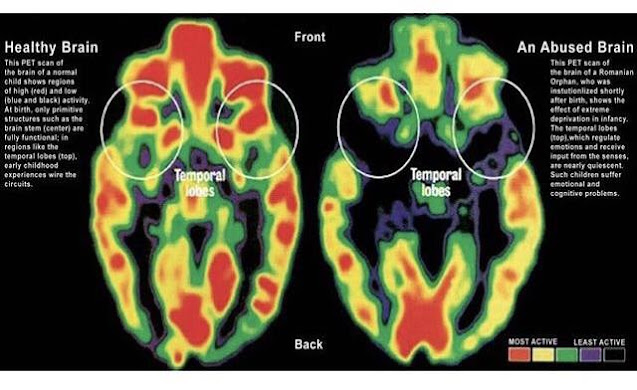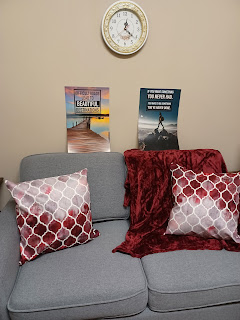When does trauma end?
When does trauma end?
The short answer is that it doesn't. More precisely, no matter how short-term or long-term the trauma has been, or is, the brain's response to trauma is the same. It rewires itself to protect the person from further trauma. So, while the incident(s) may be over with, the trauma lives inside of the person and needs to be processed before the brain can heal itself.
I saw this image today of PET (positron emission tomography) scans of a normal brain's function and that of someone who had experienced trauma. It was very telling. The front of the brain is where we do our thinking and make decisions. The temporal lobes (circled in the image) are where we process new information so the front of our brains can decide what to do. The back of our brains is where we have our automatic reactions: fight, flight, freeze, and so forth (it's also called the "lizard brain.")
Trauma interferes with our ability to process new information and to make intelligent decisions based on that info. With a heightened flight-fight-freeze reaction, traumatized people tend to filter new information through that fear response before anything else. They may expect bad things to happen.
However, the wonderful thing about the brain is its "plasticity" - that is, its ability to create new connections and pathways, to essentially heal itself. To do that, it needs favourable conditions to counteract the damage and allow new growth to happen.
Part of that MAY be medication (not necessarily, but sometimes.) And another part of it can be a feeling or atmosphere of safety. That is where therapy comes in. During therapy, the counsellor and client create an atmosphere of safety in cooperation with each other. They work together to reduce the symptoms of anxiety and depression, of panic and self-hatred that have resulted from the trauma, and they build a new way of being that is based on self-acceptance.
The method can vary depending on the client's needs and circumstances. For my practice, I try to find out what has worked for people in the past, and what has not worked. Then, I tailor-make my approach to suit the needs of my client. I am trained in a few different methods, and I often draw from different types of therapy to meet my client's needs.
And I understand that everyone is different, so not everyone will respond to my way of doing therapy. That's okay. What I encourage people to do in that case is to keep looking for someone who is trained in different approaches than the ones I use... and not to give up.



Comments
Post a Comment